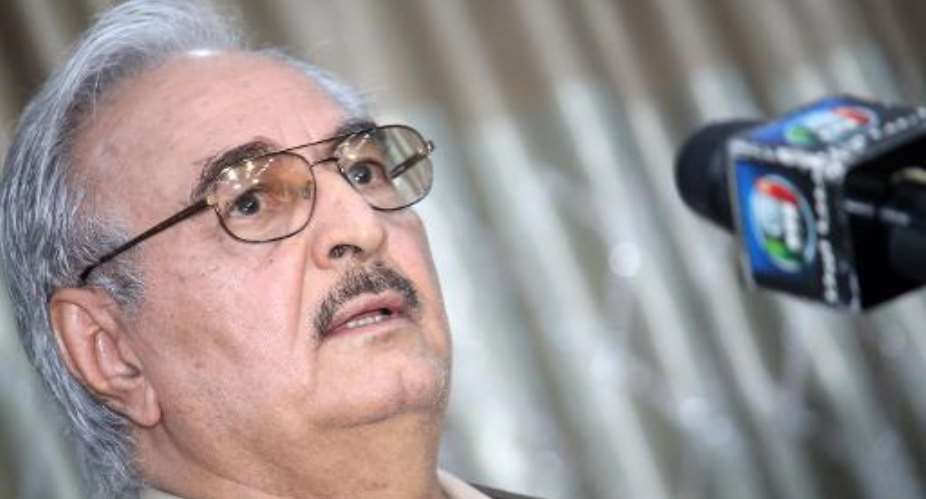Benghazi (Libya) (AFP) - General Khalifa Haftar, named Monday as Libya's army chief, is a controversial figure, seen by his supporters as a potential "saviour" and by critics as a dictator-in-waiting.
Many compare him with Egypt's President Abdel Fattah al-Sisi, a former army chief who toppled his Islamist predecessor Mohamed Morsi in July 2013 and has since unleashed a deadly crackdown on his Muslim Brotherhood supporters.
In May, Haftar launched an offensive against Islamists in eastern Libya, focused on the second city of Benghazi, prompting the then government to accuse him of trying to stage a coup.
But Islamists seized Tripoli after polls in June, sending parliament into flight to the country's far east, and the internationally recognised authorities have gradually allied themselves with a figure previously seen as a power-hungry rogue general.
The appointment aims to "legitimise" the 72-year-old general and self-styled commander of the Libyan National Army, whose forces have waged "Operation Dignity" against Islamists to try to restore order from the chaos of Libya since its 2011 revolution which ousted longtime dictator Moamer Kadhafi.
The white-haired general with contrasting black moustache and eyebrows has never been seen out of his military khakis since his return from a comfortable life in the United States to join the revolt.
He was named head of the ground forces loyal to the National Transitional Council, the rebellion's political wing, and commanded a number of officers who like him had defected from Kadhafi's army.
- Commander to rebel -
Haftar started his career under Libya's monarchy, graduating from Benghazi's military academy and travelling to the Soviet Union for training.
In 1969, he took part in a military coup that overthrew Libya's royal family and brought Kadhafi to power.
He commanded a unit during Libya's fruitless 1978-1987 war with Chad, but fell from grace with Kadhafi when he was captured by Chadian troops and Tripoli denied he was part of the Libyan army.
The US managed to secure his release, in an operation that is still shrouded in mystery, and offered him political asylum.
Haftar accepted and moved to the United States where he lived for more than 20 years and joined Libya's opposition in exile.
His time in the US gave rise to accusations he was linked to the CIA first from the Kadhafi regime, and then from rebel groups during the uprising.
After his return home to join the uprising in March 2011, a month after the revolt erupted, and despite having fought to topple the Kadhafi regime, Haftar never fully won the trust of the interim authorities.
Libya's new leaders feared he could go on to establish another military dictatorship.
His position was further complicated by his fierce rivalry with general Abdel Fattah Yunes, the military head of the rebellion killed in murky circumstances in July 2011.
But Haftar is widely supported by former soldiers from the Kadhafi regime.
Haftar has spoken out on occasion to accuse the authorities of boosting the influence of ex-rebel militias and marginalising officers who served under Kadhafi, even those who defected early on in the rebellion.





 We’ll no longer tolerate your empty, unwarranted attacks – TUC blasts Prof Adei
We’ll no longer tolerate your empty, unwarranted attacks – TUC blasts Prof Adei
 Bawumia donates GHc200,000 to support Madina fire victims
Bawumia donates GHc200,000 to support Madina fire victims
 IMF to disburse US$360million third tranche to Ghana without creditors MoU
IMF to disburse US$360million third tranche to Ghana without creditors MoU
 Truck owner share insights into train collision incident
Truck owner share insights into train collision incident
 Paramount chief of Bassare Traditional Area passes on
Paramount chief of Bassare Traditional Area passes on
 Two teachers in court over alleged illegal possession of BECE papers
Two teachers in court over alleged illegal possession of BECE papers
 Sunyani: Victim allegedly shot by traditional warriors appeals for justice
Sunyani: Victim allegedly shot by traditional warriors appeals for justice
 Mahama vows to scrap teacher licensure exams, review Free SHS policy
Mahama vows to scrap teacher licensure exams, review Free SHS policy
 Government will replace burnt Madina shops with a new three-story, 120-store fac...
Government will replace burnt Madina shops with a new three-story, 120-store fac...
